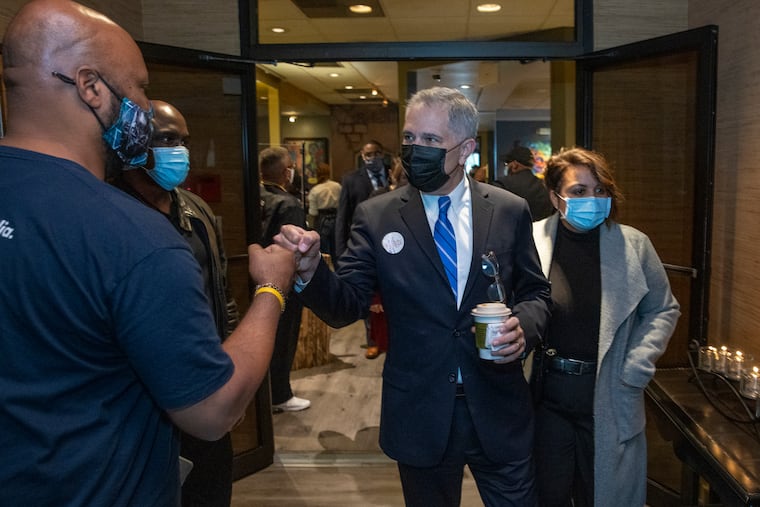DA Larry Krasner’s campaign and Real Justice PAC have admitted to breaking Philly’s campaign finance law, again
Krasner's campaign maintained a complicated relationship with the Real Justice PAC that has ended up getting both groups in trouble with the Board of Ethics for the second time.

For the second time in as many elections, District Attorney Larry Krasner’s campaign and a San Francisco-based political group that supports him have admitted to violating Philadelphia’s campaign finance law.
In a settlement with the city Board of Ethics announced Thursday, the Krasner campaign agreed to pay $10,000 in penalties and admitted making misstatements and omissions in its campaign finance reports during the progressive prosecutor’s successful reelection bid this year.
Additionally, the Real Justice PAC, a national criminal justice reform group, agreed to pay $30,000 in penalties after admitting to making omissions in its reports. The group was cofounded by the controversial racial justice activist Shaun King, who has been accused by others in progressive circles of profiteering from their movement.
After a tense campaign that drew national attention as a test of the endurance of the reform movement, Krasner ended up handily defeating former prosecutor Carlos Vega in the Democratic primary, despite support for Vega from the police union and the city being on pace for a record-high number of homicides in 2021. He then coasted to victory over Republican nominee Chuck Peruto Jr. in November.
The penalties for both the campaign and the PAC were increased because they were repeat offenders, having run afoul of the city’s campaign finance laws in Krasner’s groundbreaking 2017 victory.
The violations were slightly different this time around, but many of them centered on the same relationship between the PAC and the campaign, in which the PAC’s political director, Brandon Evans, served as Krasner’s campaign manager without officially joining his campaign staff. Instead, the campaign paid the PAC for consulting services, and the PAC employed Evans.
While such an arrangement is legal, Ethics Board Executive Director Shane Creamer said the campaign finance reports filed by both organizations made it impossible for the public to understand. The campaign’s reports described payments to the PAC for a variety of costs — ranging from travel and lodging expenses to Evans’ pay — as “Political Consulting.” Some reports from the PAC, meanwhile, provided no details on its spending for Krasner.
“There was no way for the public to know how the Krasner campaign was paying the PAC for staff, including its campaign manager Brandon Evans, and for other services,” Creamer said. “The disclosure errors by both the PAC and the Krasner campaign combined to cause a lack of public transparency about how the embedded staffers were being paid.”
Evans, who also managed Mayor Jim Kenney’s 2019 reelection campaign, cast the erroneous reports as isolated clerical errors in a large campaign apparatus.
“To put these errors in context, the campaign received over 25,000 contributions during the campaign totaling over $1.3 million,” Evans said in a statement. “It provided extensive and timely finance reports, including one that spanned 157 pages. The fines constitute approximately .5% of the total raised, spent, and reported by the campaign. Obviously, we regret any errors that were made.”